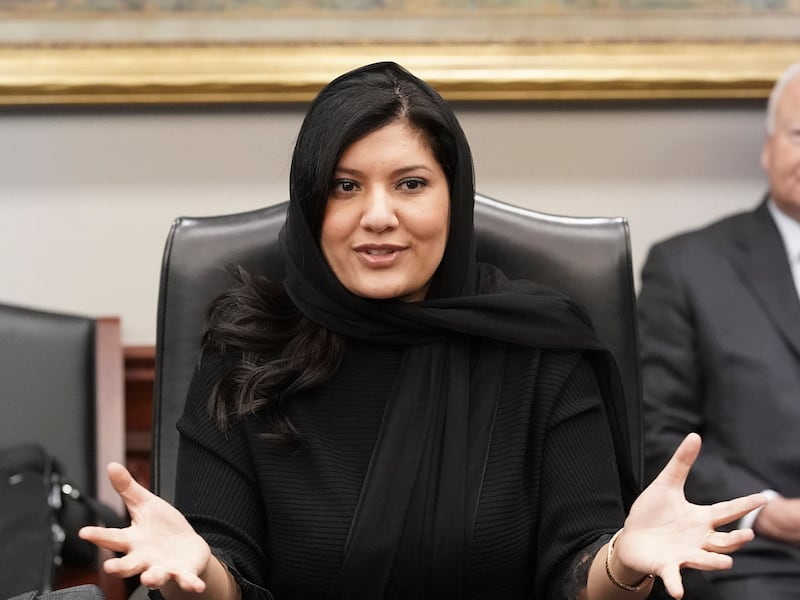SALT LAKE CITY — Saudi Arabia’s ambassador to the United States — the first woman to hold the position — met with Utah government, business and religious leaders over two days to foster relationships to help reshape the Middle Eastern country’s economy and image.
Princess Reema bint Bandar Al Saud wants to build “strategic alliances” with the state in areas such as renewable energy, technology and education as Saudi Arabia looks to become less dependent on a single resource.
“I think the narrative of Utah is inspiring to us. We see a great synergy,” she said.
During a 45-minute discussion with the Deseret News editorial board, Reema also talked about her efforts to advance women’s rights in her country, religion and the U.S. relationship with Saudi Arabia.
Reema met with Gov. Gary Herbert and legislative leaders Monday. Herbert is scheduled to lead a trade mission to Saudi Arabia in April.
Herbert mentioned the ambassador’s visit while talking to reporters at the Capitol on Tuesday about the effect coronavirus is having on the economy, saying the dumping of low-cost oil has also had an impact, including in Utah.
Many oil and gas firms were hammered Monday by the price war that broke out between Saudi Arabia and Russia, driving oil prices down in their steepest one-day drop in almost 30 years, according to the Washington Post.
“She’s trying to help us understand why they’re doing what they’re doing. And, of course, their excuse is that the Russians started it first,” Herbert said. “We have that thing that is hard to predict and is uncertain, but it does throw significant reverberations in the economy in a negative way right now.”
Also Tuesday, Reema toured the Latter-day Saint Humanitarian Center, which she said “blew my mind ... selfless giving as just an expectation.” She also said she sat down with the First Presidency of The Church of Jesus Christ of Latter-day Saints, whom she invited to visit Saudi Arabia.
“You’re faith-based. We’re faith-based. How do you accommodate faith, family, work, development, progress, technologies offering everybody everything? Is it the right thing? How do you operate in faith? How do you lead in faith? We have to learn,” she said.
Reema, 45, who grew up in Washington, D.C., where her father served as the Saudi ambassador to the U.S. for 22 years, became ambassador last summer amid efforts by Saudi Arabia to improve its relationship with the United States following the killing of journalist Jamal Khashoggi. She earned a degree in museum arts at George Washington University.
Like a marriage, the relationship between Saudi Arabia and the U.S. has its ups and downs, Reema said.
On traditional levels, it’s as strong as ever, she said, listing counterterrorism, military and economic reliance and interdependence. But, she said, the people-to-people connection is lacking. Part of her objective is to create understanding between her country and the states.
“For me, that means getting more businesses from each of your states to the kingdom, so on that level we have a stronger, thriving person-to-person, business-to-business relationship,” she said.
Reema said she first became aware of Utah because of “your beautiful ski slopes.” She praised the state for diversifying its economy, creating jobs, innovating technology and investing in solar and wind power.
Saudi Arabia is looking to transform a desert land to something that’s thriving using the resources that exist, while making sure that its human capital is classified as one of those resources, she said.
Reema said she wants Utahns to know that Saudis build their lives around faith and family. American businesses that go to Saudi Arabia aren’t just signing a contract, but a family relationship, she said.
Reema also said Saudis are a “scrappy people who are on a piece of land that was dry and desert, and we built it from scratch.”
While in Wyoming last week, Reema recognized that it was the first state to grant women’s suffrage. She also noted Utah was the first state where women exercised the right to vote.
Laws in Saudi Arabia have recently changed allowing women to drive, hold the same jobs as men, receive equal pay and travel freely. Reema said it can’t be a place where half of the community is not working or not engaged. Women, she said, need choices so they can thrive in every aspect of society.
“We’ve evolved to say that a woman isn’t an afterthought, she’s not an asterisk or comma. She’s an equal in the narrative of our community and should be celebrated as such,” Reema said. “We celebrated the mother, but we never celebrated the woman.”
But, she said, just because a law has changed doesn’t mean a mindset has changed. The same societal struggles will exist but the difference now is that women have legal recourse, she said.
In addition to women’s rights, Reema said Saudi Arabia is working toward minority and religious freedom rights, while being cognizant of the fact the Muslim world considers the entire country sacred ground.
Reema said she has invited Jewish and Christian leaders to come and talk to her about where Saudi Arabia is headed. She praised The Church of Jesus Christ of Latter-day Saints’ global outreach of care and giving.
“I think many people don’t know that, in the same way that many people don’t know the kingdom’s efforts on counterterrorism and Islamic relief,” she said.
Reema said she was fascinated by “how welcoming you guys are given that you’re so strong within the church and the Mormon faith to allow everybody else to have the equivalent quality of life, to allow them equal voice and allow them the ability to thrive in your city.”


